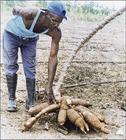
File
Mervin Thomas points to cassava reaped from his farm. Government recently announced plans to promote the increased cultivation of cassava in order to produce flour.
Reactions from the public to Agriculture Minister Dr Christopher Tufton's recent Budget Debate have been mixed.
In his recent Budget presentation, the agriculture minister promoted the production and consumption of cassava as an alternative to imported rice and wheat.
According to facts presented in the Food and Agriculture Organisation of the United Nation's 2004 'Global Cassava Market Study', there are many merits to cassava worldwide:
It is a suitable substitute for rice. It exceeds the nutritional value of rice in fibre, calcium, potassium, iron, vitamin C and thiamine. Cassava is tolerant to extreme drought conditions. Cassava is widely used in some of these countries: Barbados, Cuba, Costa Rica, the Domini-can Republic. The starch from cassava is used as a thickening and stabilising agent in a range of products such as canned and frozen food in many parts of the Caribbean and Latin America. Fried cassava and cassava muffins are used as substitutes for potato chips in many fast-food chains in Brazil. Barbadians grate cassava and make it into biscuits. The bitter cassava root is used in Cuba for the treatment of malaria and hypertension. Globally, approximately 58 per cent of cassava output is consumed directly as food, 25 per cent as animal feed, and the remainder is used as a key input for processing.

